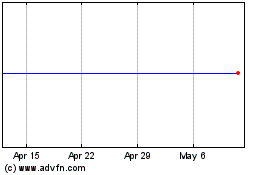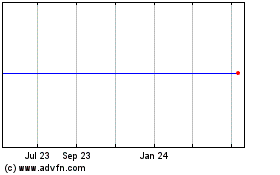Syngenta Moves to Calm Disappointed Shareholders -- 2nd Update
September 03 2015 - 2:16PM
Dow Jones News
By John Revill And Jacob Bunge
ZURICH-- Syngenta AG on Thursday moved to appease shareholders
angered by its rejection of a takeover from Monsanto Co., saying it
will divest its global vegetables seeds business and return more
than $2 billion to shareholders.
The planned sale would strip out a business that generated $663
million in sales last year, or about 4% of Syngenta's $15.13
billion in total revenue, and that boasts among the highest gross
profit margins among its seed businesses. But executives said the
vegetable-seeds division has less of a fit than other units with
its main business selling pesticides.
Syngenta Chief Financial Officer John Ramsay said the decision
to sell the vegetable-seeds business wasn't driven directly by
Monsanto's aborted acquisition effort, but that it illustrates how
Monsanto's bid had undervalued Syngenta's business.
"I hope this process will give the shareholders confidence in
the underlying value of the company and support our clear view in
rejecting the Monsanto proposals," Mr. Ramsay said in an
interview.
He declined to say what Syngenta expects the vegetable-seeds
operation to sell for, but said previous deals in the sector had
been between valued at three-to-five times sales. That suggests the
vegetables-seeds business could fetch around $2 billion to $3
billion.
Syngenta came under heavy criticism from some shareholders after
Monsanto last week abruptly dropped its long-running acquisition
effort, which would have formed the largest combined seller of
seeds and pesticides world-wide. Monsanto said last week it had
raised its cash-and-stock offer on Aug. 18 to 470 Swiss francs
($485) a share, or roughly $46 billion. Syngenta rejected the
proposal as undervalued and unlikely to win regulatory
approval.
The episode raised pressure on the Basel-based company to
demonstrate that a stand-alone strategy can deliver better value,
at a time when low crop prices have slashed farmers' profits and
forced them to scrutinize spending on supplies like seeds and
chemicals.
Syngenta Chief Executive Mike Mack said that because vegetables
are heavily grown in greenhouses, they require less pesticides and
aren't as able to be tightly integrated with Syngenta's chemical
portfolio as crops like corn and soybeans. He said that selling the
vegetable-seed operations would keep the company on track to meet
its 2018 profitability targets.
"Right now is our opportunity to do value maximization," Mr.
Mack said in an interview.
Shareholder reaction was mixed. "It is a start," said Andrea
Williams, a fund manager at Royal London Asset Management. "But I
don't think it does take the heat off the (Syngenta) management,
they still need to prove their integrated strategy is working and
the margins must improve."
While shareholders may welcome the buyback, the sale of a highly
profitable business and hard feelings over Syngenta's handling of
Monsanto's approach would still leave Syngenta with "a lot of
unhappy shareholders," said Markus Baechtold, a fund manager at
Luzerner Kantonalbank.
Syngenta shares on Thursday settled 3.5% higher at 338.20 Swiss
francs. They remain down about 10.5% since Monsanto withdrew its
pursuit.
Mr. Mack said proceeds from the divestiture, and from a planned
sale of Syngenta's flower-seed business announced in August, would
help support share repurchases. He said Syngenta doesn't plan to
pursue any major acquisitions, and that there is little chance of
any sector-changing mergers in the seed and pesticide business.
"The fact of the matter is there are not a lot of big properties
that come to the market, and to the best of my knowledge now, none
are ready to come to the market," he said.
Mr. Mack said that while some Syngenta shareholders may have
been frustrated at missing out on a Monsanto deal, others
understand Syngenta's reasons for refusing to enter talks.
"Shareholders are going to be justly rewarded for their
patience," he said.
Syngenta ranked as the third-largest vegetable-seed supplier
globally according to a January report from French seed producer
Vilmorin & Cie.
Mr. Ramsay said he expected the vegetables seeds business to be
sold as one unit, with a deal completed in the next 12 months.
Syngenta executives said they expect significant interest in the
asset from other agricultural companies and private-equity buyers,
though Mr. Mack said none had previously contacted Syngenta about
acquiring it.
Mr. Ramsay said Syngenta could sell other businesses, although
this wasn't the company's primary objective.
Neil MacLucas contributed to this article.
Write to John Revill at john.revill@wsj.com and Jacob Bunge at
jacob.bunge@wsj.com
Subscribe to WSJ: http://online.wsj.com?mod=djnwires
(END) Dow Jones Newswires
September 03, 2015 14:01 ET (18:01 GMT)
Copyright (c) 2015 Dow Jones & Company, Inc.
Syngenta (NYSE:SYT)
Historical Stock Chart
From Mar 2024 to Apr 2024

Syngenta (NYSE:SYT)
Historical Stock Chart
From Apr 2023 to Apr 2024
